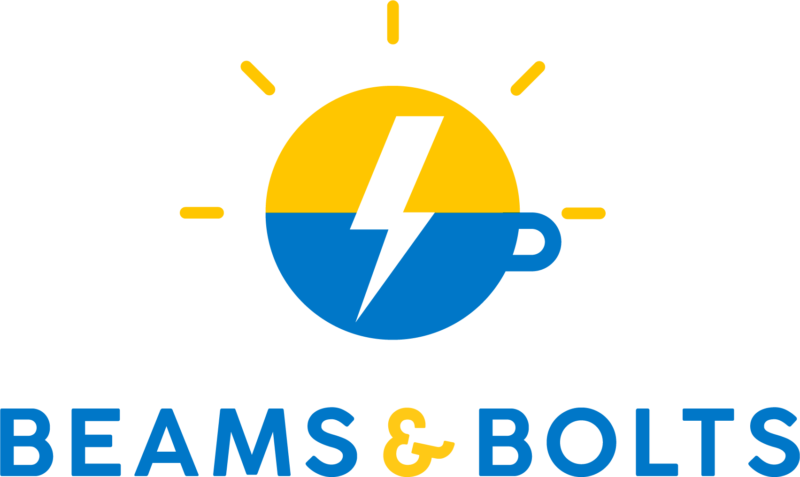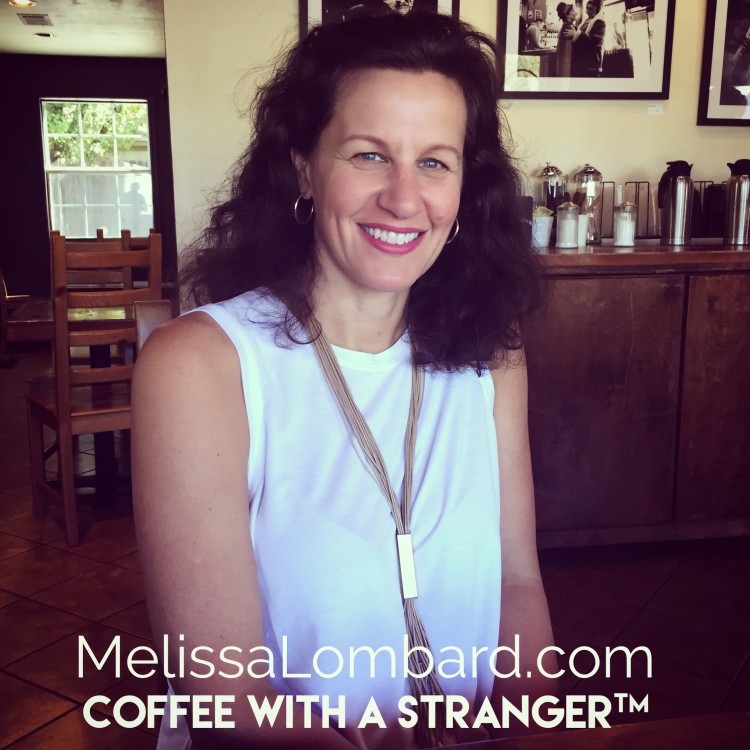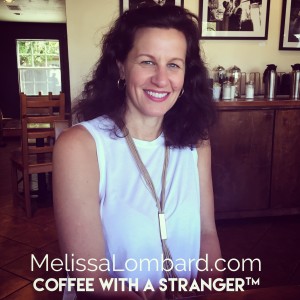The Place: Caffe Medici
The Cup: I’m on a bit of a cortado kick lately, so that’s what I enjoyed. Caroline opted for an iced coffee.
The Background: One of the most common questions I answer about the Coffee With A Stranger project is, “How do you find your strangers?” I can understand why people are curious about it. Cup 1 was the hardest. I was taking a class on Entrepreneurship from Gary Hoover and the guy sitting next to me seemed so interesting and asked the best questions. I boldly decided to ask him to have coffee with me and be a part of this project – though, in truth, to that point the project lived only in my head. Deep Nasta agreed to have coffee with a stranger and ever since that first cup, it’s gotten easier and easier to find new strangers. Largely because I operate on a referral basis. After I have coffee with someone, either I ask or they offer a suggestion of a person they know who I should meet.
In the case of Caroline, Cup 107, Ken Kuznia made his suggestion about 10 minutes into our conversation. He asked if I’d met her. I told her I’d heard her name and was familiar with her work – The Miracle Foundation, and then he offered to connect us. Fabulous!
Before we get into Caroline’s incredible story (and it is incredible!), let’s cover a few:
Common Grounds:
- What’s your guilty pleasure? Wine.
- How did you make your first buck? Babysitting. I loved that gig!
- What is the best place to eat in Austin? Guero’s.
- What is the best way to unwind? Working out. Running and weights. I run with Rogue Running and the fun thing is that we run through neighborhoods I’d probably never see otherwise.
- What’s a food you can’t live without? Fish.
- What’s the best gift you ever got? My engagement ring because it came with my husband. He’s the man of my dreams.
- What is the last thing you fixed? I’m really good at getting things with chords to work. So probably something like that.
- What is one of the best books you’ve read recently? Clay Water Brick by Jessica Jackley, Co-founder of Kiva. Jessica is a friend of mine and it was so comforting to read that book because they went through hell too. A couple of times. It was a great book.
Not all decisions fueled by alcohol are bad ones. Caroline’s journey to the creation of The Miracle Foundation is the perfect example. If it weren’t for a wild decision, made over happy hour margaritas with a dear friend, to quit their jobs and travel the world for a year, many people’s lives would be much different today. Let me back up just a bit.
Happy Days
Caroline grew up in Louisiana, the youngest of seven. A question I pose about what in her life she’s most grateful for, reveals a Norman Rockwell type of upbringing. Caroline’s dad was a pharmacist and her mom was a homemaker. Caroline says it was “Beaver Cleaver.” Adding, “Not that is was perfect. But it really was Beaver Cleaver. Mom stayed home, dad worked hard, we went to church, we lived next door to a park and got a great education. It was idyllic.”
After graduating from Louisiana State University, Caroline decided she’d move to Austin and attend The University of Texas to continue her studies in biology and psychology, further exploring the nature versus nurture topic that fascinated her greatly. She applied to UT and promptly packed up and moved to Austin. Caroline laughs when she explains to me, “I never for a second thought I wouldn’t get in. It never dawned on me that they wouldn’t let me in to the program. But they didn’t.”
What Now?
Caroline found herself living in a new city with a life plan in need of editing. So the job hunt began.
She tells me, “I was working as a temporary for a law firm and I was on my way to an interview and a guy gets on the elevator and says, ‘Wow! What a great suit!’ I say ‘Thank you. I’m on my way to an interview.’ He says, ‘For what?’ I say, ‘For a sales job with Xerox.’ He says, ‘Oh my God, if you’re looking for a sales job, I want you to stay on this elevator and go back up to the 23rd floor and hand my wife your resume.’ So I did. And they hired me.”
“They had this tiny TV station, and I started off as an account executive selling advertising. They couldn’t pay us much, so they gave us stock. That station got bought and then I worked for a bigger station. Then that station got bought and I worked for another station and that station got bought. I was in the right place at the right time. It was a great career for me. Really interesting and I learned a lot. I loved it. And selling the intangible was good practice for what I’m doing now. And all my study of nature versus nurture is also incredibly relevant.”
A Grand Adventure
She was in a career she loved, but like many of us, was also looking for something more. Maybe a little excitement. Which helps to explain how that happy hour with a girlfriend I mentioned earlier turned into a year-long adventure around the world.
Caroline tells the story, “We went back to her house and spread a world map out on the floor and started picking the countries we would see. My friend wanted to go to India because she sponsored a little boy there. We started the trip in January of 2000 and it was on that trip I ended up at an orphanage in India on Mother’s Day. I mean come on! Mother’s Day? It was like a neon sign from God.” Caroline describes the conditions and adds, “I just decided, you know, we could fix this. It’s unacceptable and it’s fixable.”
New Start
That day, the decision to start The Miracle Foundation was made. Caroline’s model is remarkable and unique. From the website, here’s an explanation of what they do: The Miracle Foundation turns struggling, institutional orphanages into stable, loving, nurturing homes where children can thrive and truly change the story of their lives. We partner with existing orphanages to implement our proven and systematic process for providing a home where ALL the fundamental needs and rights of growing children are met – from the day they arrive until the day they graduate into adulthood.
 Inspired by the 1989 United Nations Convention on the Rights of the Child, and Maslow’s Hierarchy of Needs, they created The Miracle Foundation Rights of the Child – focused specifically on the needs of orphan children. These 12 rights are at the heart of everything they do.
Inspired by the 1989 United Nations Convention on the Rights of the Child, and Maslow’s Hierarchy of Needs, they created The Miracle Foundation Rights of the Child – focused specifically on the needs of orphan children. These 12 rights are at the heart of everything they do.
If you’re interested in learning more about The Miracle Foundation story, I encourage you to visit their website and also, watch Caroline’s terrific TED Talk.
Co-piloting
I ask Caroline the big question – If you knew then what you know now, would you do it again? She says, “Asking me that today, the answer is yes. But if you had asked me that five years ago, I don’t know. I’ve been in over my head since day one. That’s really why I called it The Miracle Foundation I knew I was miracle dependent. I knew that it was a copilot situation. It was really not going to be up to me. I knew that I was there to do the work, but I was not necessarily there to be successful at it. I was just there to do it. So there have been some times when I haven’t been successful at it and that’s been real painful.”
I ask if she’s ever thought of leaving, and her answer surprises me. “Not really.” She tells me, adding, “It was so bad at one point the board of directors said they could help get me out of it, if I wanted that. Would I do it again? The answer is yes. And would I do it differently? No. I don’t think so. It’s all about trial and error. That’s how you really learn. Plus because I’ve been through so much and it’s been such a hard road, we’ve really earned our stripes. So when a sort of hot shot, would-be donor comes to me and says, ‘Let’s tweak your model.’ I say, ‘How many orphanages have you been in?’ It’s like ‘No! You keep your hands of my model. This model is working.’ You go to 107 orphanages before you tell me how to fix it. So all the errors have earned my stripes. I can stand toe to toe with people because I’ve been willing to fail, so terribly. If you want to find someone who’s failed worse than me in this field, I dare you. I don’t think you will.”
 Real News
Real News
For Caroline, the most significant thing that’s happened to her in the last 30 days is pretty big. She was in New York when The United Nations Global Goals came out two weeks ago. The Global Goals are 17 goals that the world agrees upon. Things like, the end of poverty, the end of hunger, gender equality, healthcare for all, education, clean water, clean oceans. Along with the goals, there are 169 indicators to measure progress and ensure forward movement.
Clearly just a little disappointed, Caroline explains, “I was a huge part of the lobby for orphans on those goals. And we failed. But the fact that they came out and that the world agreed upon them – to me, it’s what’s great about being alive right now. We’re leaning up against human evolution. The kids today will not have people dying of starvation in their lifetimes. That’s the most significant thing that’s happened in the last 30 days.”
We talk for a moment about how sad it is that Trump’s hair is getting more press than something so globally significant as these goals. Caroline says, “The other day I was talking to a reporter about just that. She said, ‘We don’t report the number of planes that take off. We report the ones that crash.’ I get it. I don’t like it though. We have cut poverty in half in the last 20 years. With a billion person population increase.” Now that’s what people should be talking about!
Empowerment
If happiness were the national currency, how would Caroline make her living? She says, “Exactly what I’m doing. It’s not for the money, or the fame, or the glory, or the comfortable living conditions once I get to India. None of that. I work for giving people the opportunity to make a difference, which is what we all want to do. It’s an opportunity to let people take care of other people. It’s not as much about the orphans as people think. It’s more about the orphanage. It’s about giving people an opportunity to change the world. Because they really do want to. They really do want to be a part of something bigger than they are. And something that works.”
“If I thought I was better at running an orphanage and raising kids myself, I’d be doing that. But what I’m better at is being an advocate and giving people a reason to step into bigger shoes. And think about someone other than themselves. To fill that God-shaped hole that everyone has. And that’s only filled by giving and by selfless service. So that’s what I’m doing. Giving people an opportunity to fill that God-shaped hole.”
Awareness
What’s the biggest issue facing society, in Caroline’s view? She tells me, “That people don’t understand we’re all united and we’re all one. If we all understood that when one suffers we all suffer. Or that when we bash one, we’re bashing all. I think that’s society’s problem. We don’t understand that we’re all one. But I think people are starting to get it. I think that’s what globalization does. Why else would you support a stranger? A total, absolute stranger? Someone who’s never going to thank you. Never going to repay you in any way. It’s not a loan. People do it because they understand that there’s some sort of connection there. It’s not a lack of connectedness that’s the problem. It’s a lack of an awareness of the connectedness. We are connected, whether we think about it or not.”
Facing Fears
What is something Caroline thinks people would be surprised to learn about her? She surprises me by sharing, “Maybe that I have a lot of insecurities. I really struggle with self-doubt. I have to work on that a lot. I do things afraid, a lot!”
I’m so curious about what is it that drives her. What makes her say, “I’m feeling the fear, but I’m doing it anyway?” She says, “Well, that’s what courage is, right? The root word for courage is coeur – which is French for heart. So like when I started The Miracle Foundation – what did I know about orphanages? What did I know about social work? What did I know about India? What did I know about fundraising? Nothing. I didn’t know anything. Every day it’s about stepping out of my comfort zone to fight for something I believe in with my whole heart. And yet, there’s still that awful, mean voice. I still have that fear and self-doubt and the self-critical voice.”
All Together Now
If given 30 seconds to make a speech to the world, Caroline’s message is simple. She says, “We have this golden opportunity to lift our brothers and sisters out of poverty. We all just need to do our part. It’s our moment and if we all lift, it won’t be heavy.”
I left my meeting with Caroline with so many thoughts running through my head, and feeling more full of hope than ever. Caroline’s story was a powerful reminder that even when the road ahead of us seems daunting or uncertain, we need only look behind us to see how far we’ve come. Our past is the proof that we’re more than capable of carrying on. Everyone, even those who seem to have it all figured out, struggles with self-doubt from time to time. We don’t have to feel confident in every moment to do great things. As Caroline says, sometimes, we have to do things afraid. Follow your heart and you’ll find the courage. And never discount those back of the napkin, happy hour, margarita-fueled ideas. Great stories can begin anywhere – even from a barstool.
__
If you enjoyed this interview, “Like” the Coffee With A Stranger Project Facebook page and you’ll be the first to know about upcoming interviews with new strangers and other fun stuff. If there’s someone in Austin you think I need to have coffee with, let me know and I’ll do my best to sweet talk them into having coffee with a stranger.


